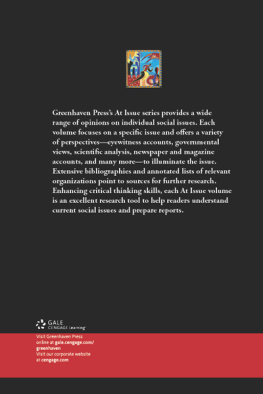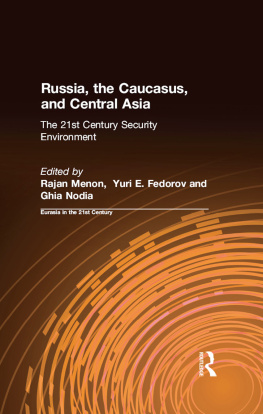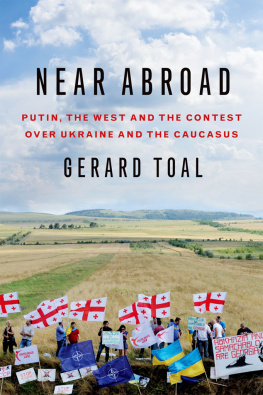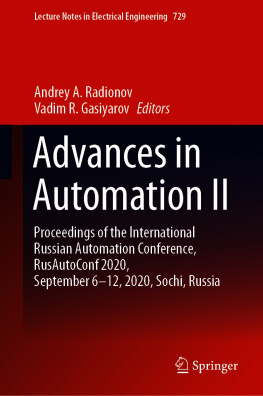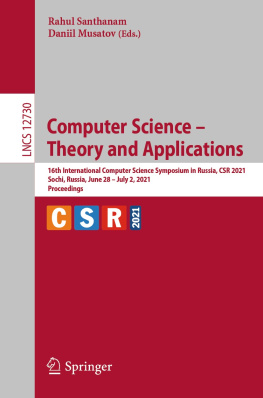| About the Author
Sergey Markedonov is a visiting fellow in the CSIS Russia and Eurasia Program. He is an expert on the Caucasus, as well as the Black Sea, regional security, nationalism, interethnic conflicts, and de facto states in the post-Soviet area. His publications include several books and reports, sixty academic articles, and more than 400 press pieces. Recently published books and reports include The Rise of Radical and Nonofficial Islamic Groups in Russias Volga Region (CSIS, 2013); De Facto States of the Post-Soviet Space: 20 years of State-Building (Institute for the Caucasus, 2012); The North Caucasus: Russias Volatile Frontier, with Andrew Kuchins and Matthew Malarkey (CSIS, 2011); and Radical Islam in the North Caucasus (CSIS, 2010).
Markedonov graduated from Rostov-on-Don State University in 1995. He earned his doctoral degree in history at Rostov-on-Don State Pedagogical University in 1999. From 1996 to 1999, he was a lecturer in the History Department of Rostov-on-Don State Pedagogical University. From 1998 to 2001, he served as a senior fellow in the governors press service in the Rostov regional administration. From 2001 to 2010, he worked as head of the Interethnic Relations Group and deputy director at the Institute for Political and Military Analysis in Moscow. From 2006 to 2010, he also held teaching positions at the Russian State University for the Humanities, the Moscow State University, and the Diplomatic Academy.
| Olympic Capital in a Turbulent Environment: Security Challenges
I n 1972 the Summer Olympics in Munich were shattered by the murder of eleven Israeli athletes by Black September, a Palestinian group. The Games were used as an arena through which to draw attention to the conflict in the Middle East and the national demands of the Palestinians. Since that time, the organization and planning of each Olympics has incorporated serious security preparations.
Compared with other cities that have recently hosted the Olympic Games, such as Beijing, London, and Vancouver, Sochi is much more vulnerable from a security perspective. It lies approximately 100 kilometers from Karachay-Cherkessia and less than 200 kilometers from Kabardino-Balkaria, where political violence claimed 156 lives last year.
The Greater Sochi (Bolshoy Sochi) area (which includes other resort areas, such as Loo, Lazarevskoye, and Adler) borders, across the river Psou, the partially recognized Republic of Abkhazia.
In recent years the number of terrorist acts across the North Caucasus has been reduced. The most impressive example is Ingushetia, where in 2011 the number of victims of acts of terrorism and sabotage dropped to 108 killed and wounded, compared with 326 in 2010. Even in Dagestan, which has had the highest rate since 2005, there was a 15 percent decrease from 2011 to 2012. The North Caucasus remains the most unstable and unpredictable area of the Russian Federation. In 2012, 700 people were reported killed and 525 injured as the result of political violence. However, the North Caucasus brings instability outside the region itself. In late 2013, a series of terrorist attacks took place in Volgograd in southern Russia. A suicide bombing of a city bus (October 21) killed 8 people and injured 37. An explosion at the railway station (December 29) killed 18 people and injured 45. And an explosion on a city trolley (December 30) killed 16 people and injured 25.
The social and economic malaise of the North Caucasus has exacerbated the threat of terrorism and extremism. The North Caucasus Federal District (an administrative entity encompassing Stavropol Krai and the Republics of Chechnya, Dagestan, Kabardino-Balkaria, Ingushetia, North Ossetia-Alania, and Karachay-Cherkessia) is plagued by chronic unemployment. Its overall unemployment rate of 14.6 percent in 2012 was the highest of any Federal District in Russia. According to the Russian Ministry of Labor, unemployment in Chechnya was close to 32 percent in 2012, although it had declined slightly from previous estimates. Unemployment was even higher in Ingushetia, at 48.6 percent. This data refers only to those who have officially registered as unemployed; according to unofficial reports, 70 to 80 percent of all young people (defined as people under 30) in the North Caucasus have no permanent employment. This is the result of the ongoing economic crisis in the region and the low levels of education and training.
Salaries are also much lower in the North Caucasus Federal Districtless than half of the national average in Dagestan. The only exception is in Chechnya, where the average salary has exceeded the region-wide rate every year since 2007. This is almost certainly due to the massive amount of money that has been pumped into the formerly restive republic by the federal government in an effort to revive the economy in the wake of two Chechen wars.
The economic development indicators of the North Caucasus are the lowest in Russia, except in the cases of a select few agricultural products and industries. The former giants of heavy industry have either closed (including Tyrnyauz Mining in Kabardino-Balkaria) or are struggling to survive and facing drastically reduced production levels (such as Electrozinc in North Ossetia or the Dagdizel plant in Kaspiysk, Dagestan, which produces military industrial supplies). It is strikingly symbolic that in October 2010 the Federal Security Service of the Russian Federation (FSB) and the forces of the Russian Interior Ministry carried out an operation to eliminate a group of militants entrenched in one of the Tyrnauzs abandoned mines. Data on the oil industry in Chechnya is almost wholly unavailable or unknown, and critical transport infrastructure to the region is less well developed than in central Russia. At the same time, approximately 30 percent of the population is involved in the illegal shadow sector of the economy in the North Caucasus (alcohol production, smuggling, and poaching). Rates of participation in the shadow economy are especially high in North Ossetia (80 percent), Ingushetia (87 percent), and Dagestan (75 percent).
These economic difficulties exacerbate an already volatile security environment. The Dagestan Vilayet (front or organization), also known as Jamaat Shariat, is one of the strongest militant groups in the North Caucasus and has been responsible for many high-profile terrorist acts, including a bombing during a military parade in 2002, the murder of a police official in Dagestan in 2005, and the death of the head of the Dagestan Interior Ministry in June 2009. It is considered to be a part of the Caucasus Emirate (CE), which is led by Doku Umarov, a self-styled jihadi of Chechen origin who leads a movement that has replaced the national separatist and Sufi-oriented Chechen Republic of Ichkeriya (ChRI) project with efforts to create an Islamic state across the North Caucasus.
CE has worked to expand its activities and state-building efforts across Russia, utilizing concentrated Muslim populations in Tatarstan, Bashkortostan, and elsewhere as platforms for further expansion. Umarov has announced his readiness to liberate not just the nearby Krasnodar Krai but also the Astrakhan and Volga territories from the occupation of the Russian kafirs [infidels]. Doku Umarov has claimed responsibility for a number of significant terrorist acts outside the North Caucasus as well. These include the attack on the Domodedovo airport (2011, 36 killed), the explosions in the Moscow metro stations (2010, 39 killed), and the Nevsky Express railroad bombing (2009, 26 killed). Although Umarov portrays himself as the head of shadow state that follows his orders and statements to the letter, the CE is a network of different subgroups and therefore does not operate hierarchically. Subgroups often change their names (fronts, vilaiyats, or welayats) and leaders. In support of Islamist supra-ethnic ideas, the different groups of the CE tend to wage their own wars within existing inter-republican borders. The Caucasus Emirate tries to play the role of an umbrella structure uniting different cells through a common ideology based on jihadist principles.


